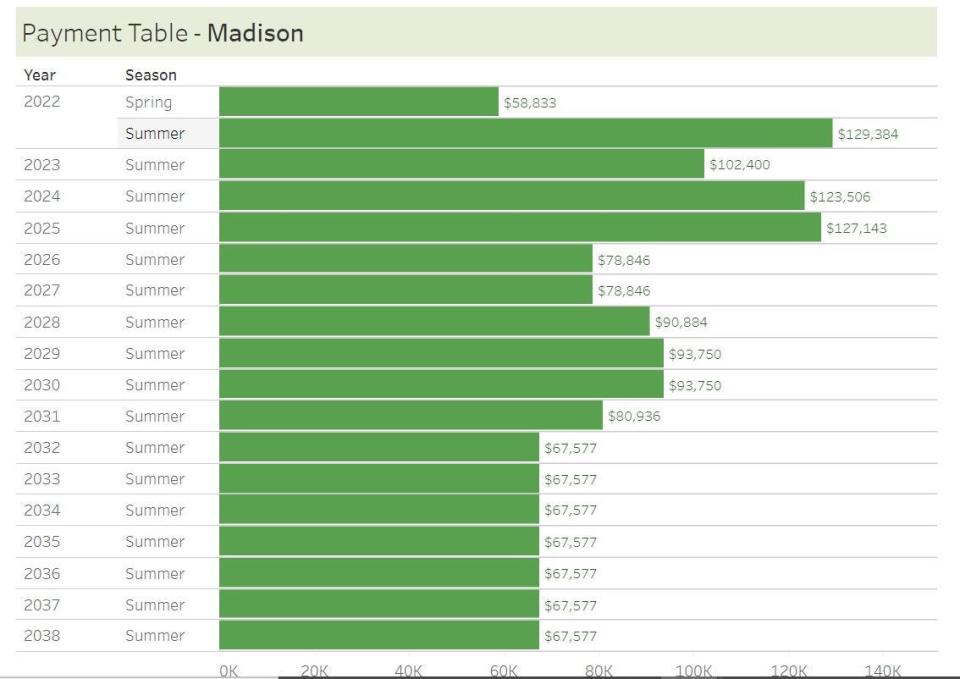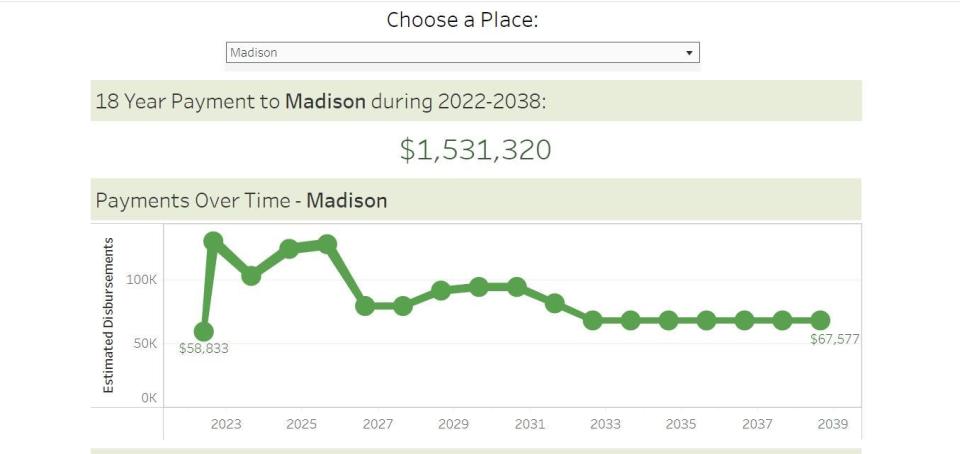'Don't Asheville our Madison County': Residents concerned about opioid settlement options
MARSHALL - A number of Madison County residents made it clear during the Board of Commissioners meeting July 12 they did not approve of drug treatment programs such as methadone clinics in the county.
However, no such drug treatment program is proposed for the county, and the residents' concerns are due to misinformation, according to the commissioners.
In its Nov. 30, 2021, meeting, members of the county health department met with the board to brief members on potential funds the county could receive as part of a state settlement with opioid manufacturers and distributors.
In April 2021, N.C. Attorney General Josh Stein and the state Association of County Commissioners released a Memorandum of Agreement outlining how the state would use the proceeds of settlements from the three largest distributors — McKesson, Cardinal Health and AmerisourceBergen — and one manufacturer, Janssen Pharmaceuticals, as well as its parent company Johnson & Johnson.

The settlements require that the distributors and J&J pay $26 billion over 18 years, with approximately $22.7 billion available to state and local governments to address the opioid epidemic through treatment, recovery, harm reduction, and other life-saving programs and services, according to Stein and former NCDHHS Secretary Mandy Cohen's joint campaign, More Powerful NC.
Related: Madison County's opioid-related overdoses increased 108% from 2017 to 2020, county says
Asheville homelessness: New funding, staffing approved to address crisis. Is it enough?
According to Interim County Manager Norris Gentry, the county has agreed to receive the court-awarded settlements, and it will be issued $1.5 million over the course of 18 years to specifically address the effects of the opioid epidemic.
The agreement offers local governments two options:
Under Option A, a local government may fund one or more strategies from a shorter list of evidence-based, high-impact strategies to address the epidemic.
Under Option B, a local government engages in a collaborative strategic planning process involving a diverse array of stakeholders and may then fund a strategy from the Exhibit A list or a longer list of strategies (Exhibit B) included in the national settlements.
More Powerful NC lists 12 high-impact strategies under Option A, including:
Collaborative strategic planning to address opioid misuse, addiction, overdose, or related issues.
Evidence-based addiction treatment, such as Mediation-Assisted Treatment programs, such as the MOUD (Medications for opioid use disorder)/MAT (Medication-assisted therapy) program offered at the Madison County Health Department.
Funding evidence-based recovery support services, including peer support specialists or care navigators based in local health departments, social service offices, detention facilities, community-based organizations, or other settings that support people in treatment or recovery.
Programs offering recovery housing support to people in treatment or recovery, or people who use drugs, such as assistance with rent, move-in deposits, or utilities.
Fund programs offering employment support services to people in treatment or recovery, or people who use drugs, such as job training, job skills, job placement.
While the county has agreed to enter the agreement, it has not decided between Option A or Option B.
A host of residents expressed their disapproval of the potential of the county opting into Option A.
"Plan A gift-wraps a magnet that will destroy property values, be with us a long time and forever change the quality of life in Madison County," Tony Ponder said.
"The opioid settlement money coming into Madison County should be spent on our residents for evidence-based addiction treatment, not putting an addict in a low-barrier shelter and supplying them with crack kits and needles," Sherry Morgan said. "We say choose Option B and help people on a case-by-case basis, which could also include money for drug court. Don't Asheville our Madison County."
A data dashboard outlines the payments scheduled to Madison County, which includes a $58,833 allotment in spring 2022, $129,384 in summer 2022, $102,400 in summer 2023, $123,506 in summer 2024 and $127,143 in summer 2025. The county will also receive $67,577 every summer from 2032-38.
Commissioners' responses
Board Chair Mark Snelson said no one on the board had engaged in any discussions on a new treatment facility in Madison County.
"I hate to bust your bubbles, but there's nobody up here that's mentioned a methadone clinic, nor do we want a methadone clinic," Snelson said. "The $1.5 million is over 18 years, not per year, from the drug settlement."

Commissioner Michael Garrison said residents' confusion may be due to the county recently being awarded a Substance Abuse Prevention and Treatment Block Grant in state budget funding.
According to Gentry, Madison, along with Cabarrus and Haywood Counties, are receiving funding from this portion of a federal program.
"The state has awarded a certain amount of funds for one particular thing, and then the opioid funds, which are a lawsuit, are awarded on a different thing," Garrison said. "I think there's some confusion about each one of them. If you'll go back and read the particulars of the outline's Plan A/Plan B ... we discussed those eight months ago. That's the opioid settlement money.
"If you go back and look at the Substance Abuse Prevention Treatment Block Grant, that's money that comes out of the state, and that has restrictions on it as well. Just a little research (is needed). I like the fact that everybody gets excited about it. I've been in law enforcement a long time, so it's good that people have concerns. That's why you're here, and that's why you have the opportunity to voice them, so I appreciate it."
Commissioner Craig Goforth said "nobody (on the board) wants a methadone clinic."
"Nobody up here wants a methadone clinic," Goforth said. "I do not want a methadone clinic. That won't have my vote. Nobody to my right wants that."
In the Board of Commissioners June 28 meeting, county health officials Deana Stephens, the county health department's community programming director, and Jodi Brazil, the coordinator for the Madison County Health Consortium, shared the 2021 Community Health Needs assessment findings with the board.
OPINION: For Buncombe County, here's our chance to turn the tide on opioid epidemic
Previous coverage: Buncombe 2020 overdose death rate among NC's highest. An incoming $16M is supposed to help
The assessment revealed the county experienced a 108% increase in opioid-related overdoses from 2017 to 2020. Substance use/mental health was the second most common issue raised in surveys from more than 500 respondents throughout the county, behind only obesity and pre-diabetes concerns.
For these reasons, Gentry stressed the importance of the county's deliberations in assessing its options for receiving the MOA funds.
"(Option) A and B were, and remain, only suggested options," he said. "This is very important, and to take care to develop what is best for each individual community."
Whichever option the county chooses, it will be subject to meet certain criteria, according to Rachel Potter, the county health department's MOUD/MAT program coordinator and bridge counselor.
"They have to deal with community stakeholders, and there's a list of different people they have to get feedback from, like the health department, the Sheriff's Office, and things like that," Potter said.
The Madison County Board of Commissioners will meet August 9 at 7 p.m. at the Madison County Center - North Carolina Cooperative Extension, located at 58 Carolina Lane in Marshall.
This article originally appeared on Asheville Citizen Times: Madison County Board of Commissioners mull opioid fund plans

